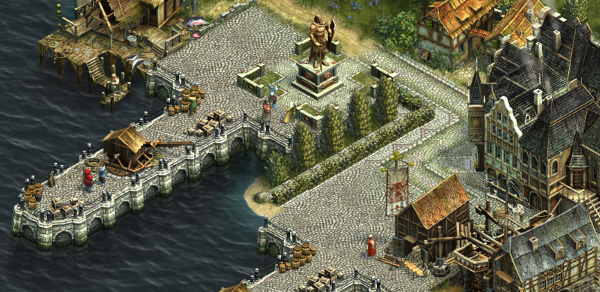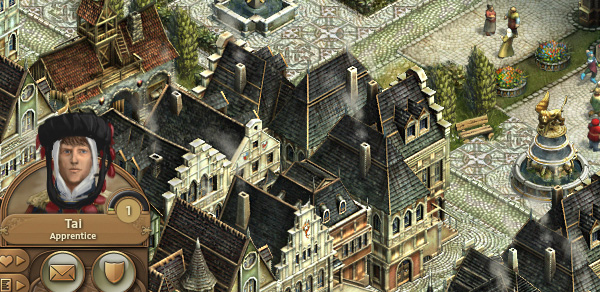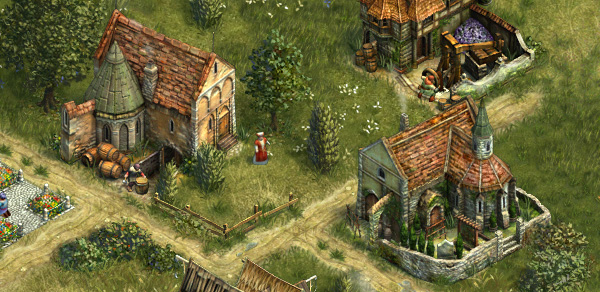Anno Online Sets Sail For New F2P World
Settle for less
Two things immediately jumped up and waved pointedly when I heard about Anno Online. First, 'Online' isn't a year - that name is Silly. Second, doesn't Ubisoft/Blue Byte already have a historical, economics focused city-builder game called The Settlers Online? For the first, the answer was 'Nobody likes a padent'. As for the second, yes, there are definite similarities, but Anno Online takes a rather different approach to creating the perfect society...
Like all of Ubisoft's recent online announcements, Anno Online is a free to play game that runs directly in your browser and, like the best tactic for beating Quick Man, is based on Flash. At a glance, it's extremely similar to the regular games rather than being a cut-down Farmville style affair, and while the demo I got to see was short, the basics are similar. It's not enough to simply have a market for instance; it has to be within a radius of the homes it's servicing, and you can see that via a handy overlay. There's no combat or competitive play, at least at launch, with the main online element revolving around trade and forming co-operative guilds.
To begin with, you have one default island - and everyone gets the same one. Here, you get to build basic units like houses and markets, but will soon find that you don't have any land that can grow wheat or provide other key resources. At that point, it's time to build or buy a ship, head out and fill your nine island slots with other lands - and in doing so, build a considerably more complex chain of resources and goals than you'll get in the smaller-scale The Settlers Online. Unlike that game, there was also no talk of specific quests; just building an empire.
The core idea is that nobody will be able to be completely self-sufficient, creating both a general economy for resources and encouraging co-operation - a general trading market, and more specific deals with friends to exchange your wheat for their coal or whatever else. You can also work directly with friends on larger prestige buildings, including the giant cathedral you see in the screenshots, that will take ages even with assistance and a single player simply can't make alone. Islands that you unlock will have fixed maps, but randomised elements, to help avoid everyone ending up with essentially the same photocopied island after a couple of months.
Aesthetically, it's a pretty enough game - though personally I prefer my cities to have a bit more life to them, a la Settlers or the classic Impressions games, and found the look of it quite sterile. You will be able to visit other players' islands to see what they've made, though Blue Byte remained quiet on whether or not you'd actually be able to do anything while there - the obvious thing being for an invited, more experienced player to be able to come in and poke at your resource chains and building placements and offer a little helpful advice if necessary.
As far as the cash shop goes, Blue Byte remains somewhat cagey, though it's incredibly unlikely that you'll be able to just side-step the player economy by buying a big bag of wheat whenever you like. There will be progress-boosters though, letting you do things like simply buy a ship to go trading instead of having to build one yourself and probably speed up buildings. You'll also be able to buy cosmetic buildings - plazas, fountains and so on - to make your cities look more interesting, though whether these will involve purchasing a blueprint type item or paying for individual bits of prettinesss remains shrouded in mystery for the moment.
The single most important thing though is that the nine island slots you have available to you have to be unlocked. You get one to start with, and all players have access to four. The other four are for paying players only though, which will obviously be a massive advantage. You'll have to deal with more complexity, but will be able to be much more self-sufficient, and spit out far, far more resources for trade - a massive advantage. The islands screen I saw had a straight-up 'Buy Rights' button suggesting that these will be one-time purchases.
Much as I hate the big "E", there's also an obvious question of what the endgame is going to consist of. Unless you're aiming to create the next Magnasanti, there's a limit to how much time most folks are going to want to spend on the same society. There is however scope for this to be widened after launch, including adding different types of island - the Middle East alongside the classic medieval style for instance - and the current PvP systems. Blue Byte told me that these will be coming, but "perhaps not in a way you might expect."
I look forward to having a whole island devoted to the production of smallpox blankets.
Anno's ultimate success will come down to two things - how complex it actually is compared to the original games, and how well it manages the player economy both in its general resource trading market and handling the impact of real-world cash on it. It needs to be more than simply Anno running in a web browser, and that's only going to happen if it can convey the feeling of your island civilisation being part of something bigger than itself. If that fails, or simply doesn't have a big enough impact once you've got all your islands, you may as well just be playing the regular single-player game where you know you'll never be nagged for cash.













